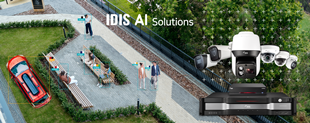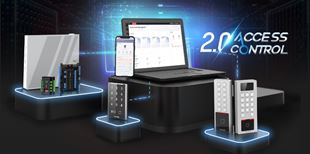Are you happy with your Ifsec?
"We are satisfied. There are fewer exhibitors here, and also fewer exhibitors focusing on biometric solutions. There are only about three meaningful biometric providers here at the show, but there are still visitors who are looking for biometric solutions, so we probably gained more attention."
Why do you think there aren't more biometric companies here?
"I think it's related to the economy. If the economy affects the security market, biometrics cannot be an exception. What's interesting is that in difficult times like these, the companies who can invest in marketing will come out stronger and be more successful. We have doubled the size of our stand, while other companies have cut down or even stayed at home."
How significant is Ifsec for Suprema?
"It is the most important event for our company. We have been here since 2003, when we were really small, at that time it took about an hour to set up the stand, now it takes at least a few days. This is an excellent opportunity to launch new products and present our solutions. Intersec Dubai is also a very important show, and it's growing both in size and importance.
Besides these we do a number of specialist biometric events in the US and the UK, where we focus more on our border control solutions since these shows are more geared towards government and public authorities."
What is it that you want to show the Ifsec visitors this time around?
"We focus on our new products, which fit very well with current trends and market needs. We have the Biolite Net, which is taking a shower on our stand to demonstrate its water-proof feature, it's an IP based outdoor access reader, in a nice design. The Biolite Net is attracting a lot of attention, and was a finalist in the Ifsec awards. Besides that, we have the Biostar, our distributed access control system software that combines IP connectivity with biometric security. What we also try to communicate is that we are not trying to sell devices, we are proposing a total solution that is more comfortable to use and looks more attractive than conventional readers, which we have learned is a concept that appeals to a lot of visitors."
Are all the devices designed and manufactured by Suprema?
"Basically we are specialists in fingerprint technology, we develop and manufacture a lot of fingerprint modules, which is like the engine of embedded biometric identification products, but we do also manufacture finished products for access control and time attendance. The system is actually fully open so that basically any kind of card readers can be integrated in to our system. Biometric solutions used to be a kind of a special device, there has however now been a transformation - biometric devices are now the basis of our system, to which you can add card readers of all sorts."
What is the size of the Suprema company?
"We are not that big, we are however one of the fastest growing companies in the entire security industry. We have enjoyed almost 100 percent growth every year, also last year, and we were the first Korean biometric company to become publicly traded on the stock market. Market cap is more than 200 million US dollars, and the company is profitable. In the security industry, some people are still skeptical towards biometrics. I would say that IP cameras and biometrics are the only segments where providers can make a meaningful and solid margin. Because these are the only areas, that offer technological uniqueness along with new innovative solutions and applications. Otherwise, with older technologies it's more difficult to differentiate, and often making price the only way to differentiate which of course damages margins. The company employs 70 people. Last year we had a turnover of 20 million US dollars, in 2007, the turnover was 10 million."
That would suggest 40 million in 2009?
"I don't know, we expect more than 30 million, but you know it is of course becoming more and more difficult to double the revenues as they increase. Being a publicly listed company, everybody can see our numbers."
How long have you been with the company?
"Since the beginning in the year 2000, I am one of the co-founders. The co-founders studied at the same university, and have been working within industry, at Samsung and other companies, before we started this venture together. We are six co-founders, and all of us are still very much active in the company."
What would you say that the key factors to your success are?
"One thing that we share with other successful Asian manufacturers is of course that we can provide an attractive combination of technology and price. In fingerprint technology, we made ourselves a name by winning some fingerprint projects, which gave us an opportunity to verify the quality of our technology. Our price is about three times higher than other Asian providers, which is because we have been successful in positioning ourselves as a provider of high quality products."
What do you think it will take to make biometrics more of a mainstream, accepted technology?
"One obstacle has been the cost and another the technology: now the technology has improved a lot, even if it's still not 100 percent bullet proof. But the combined solutions where you integrate fingerprints with cards or keypads, is an extremely efficient and secure solution. At the same time, the cost of components is becoming cheaper. For example the components we provide are already more than 50 percent cheaper than they were five years ago. This means that volume and market become bigger and bigger, and because of that price is coming down even more.
So far, biometric technology has had greater success on the emerging markets - South America, Asia, Middle East - where as the major, more mature, markets, Europe and the Americas, have not yet accepted biometrics as much. We expect continued growth and a bright future, with an opportunity in taking the experiences from the emerging markets to the rest of the world.
If you compare Intersec Dubai with Ifsec, the difference is obvious. Here at Ifsec, card readers and keypads dominate the access control market and there are very few biometric companies, whereas at Intersec, biometric is dominating the scene. That illustrates the difference, and we believe that the US and Europe will catch up."
Where does that difference come from, are the North American and European markets more conservative?
"Europe and North America has very long experience, and a long tradition, of security. Many of today's major suppliers were established many years ago. On the emerging markets, they started from zero not that long ago, and of course they want to start with the best and most recent advancements in technology, which is biometrics, smart cards, etc. We are however looking to new installations and also many installed sites that need upgrade on the more mature markets. We are going to address that by supporting conventional card readers together with our biometric solutions.
Security industry key players in the UK and the US seem to ignore that the markets to some extent are changing, they are perhaps too conservative. The large global security providers have to at least consider biometrics because people ask for it in Asia, the Middle East and South America.
The trends differ from different parts of the world. In the US, UK and Europe, the markets are generally more conservative, and the suppliers that focus on these markets only do not have the full global picture. It's not a question of some companies doing it right and others doing wrong, we work and function on different markets, with different customers."
Is fingerprint technology the best biometric technology?
"We think it's the most suitable and for now the most accepted biometric technology. Fingerprints can be used in a large variety of applications. Iris recognition or face recognition might be better in some ways, but the market is smaller because of cost and user acceptance."
Will Suprema expand into other segments?
"We have been very successful with fingerprints but we are definitely always looking at and experimenting with other types of innovative technology, not only biometrics - we are interested in other types of identification as well. We do not want to limit ourselves to be a fingerprint or biometric player."
How important is development of new products and marketing to you?
"We invest more than 15 percent of our revenue into research and development, and 5-10 percent into marketing. We recognise the importance of marketing; It is important to keep and strengthen our position and the awareness of our brand.
I think that Axis is a really good company, and we are watching them closely to learn from them, regarding things like marketing. Interestingly enough, there are very few companies in the security sector that are fashionable regarding their marketing, and I think Axis is one of the few who are good."
Which regional markets do you currently target?
"It's a well diversified mix, in 2008 our market shares for Asia, the Americas and Europe, were very equal, and there isn't any specific market that we want to put more efforts into right now. The US and the UK are difficult markets to get into, and Sweden and Norway are too safe..."
Just like with for instance IP video, the large global security providers might move more into biometrics if the demand keeps growing. What is your take on that?
"We think it's a good thing for biometrics, in some ways it's of course a threat, but really more of an opportunity for us as a specialist. It would open up for cooperation."
Do you cooperate with any of the big players today?
"Not really, we would be open to do OEM's if we could make an agreement with a partner that is reliable and if the cooperation could be beneficial to our brand. It's very important to get the initiative, to be early in the market, like Axis was. And just like Axis still is the strongest at what they do even with big players like Bosch and Sony as competition, so can we be."
What do you see in the future?
"We are very interested in card technology - cards and biometry can form a very good combination. Smart cards can be very secure and effective, and using biometry you can confirm the owner of the card to make it even more secure. I do not believe that card based access control will completely disappear for biometrics to take over - it's complementary. For instance, for employees it can be the best solution just to use fingerprints, but for visitors cards make more sense. We don't see them as competing technologies but complementary."

















